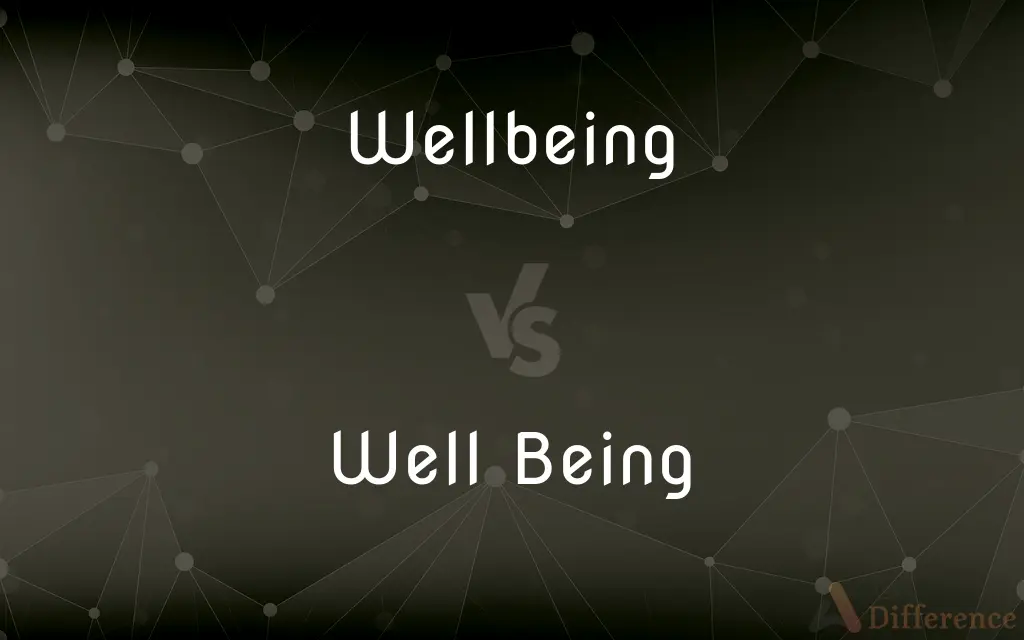Wellbeing vs. Well-being — What's the Difference?
By Tayyaba Rehman — Published on November 2, 2023
"Wellbeing" and "well-being" mean the state of being comfortable, healthy, or happy; the former is a more modern, single-word form, while the latter is a traditional two-word form.

Difference Between Wellbeing and Well-being
Table of Contents
ADVERTISEMENT
Key Differences
Wellbeing" is often used in British English as a single term that encapsulates the overall health, happiness, and comfort of an individual. "Well Being," however, as two separate words, is less standard and could imply a more casual, less established use in the context of someone's state of health and happiness.
"Wellbeing" encompasses various aspects of a person's life, including mental, physical, and emotional health. "Well Being," written as two words, is used less frequently and may not be recognized as the standard form in formal writing or publications, but it conveys the same meaning.
"Wellbeing" is considered a noun and is widely used in psychological and health-related literature. On the other hand, "Well Being" is not the conventional grammatical form, and its usage might be considered a stylistic choice rather than a standard grammatical form.
"Wellbeing" is universally understood in English-speaking countries, referring to a holistic sense of wellness. "Well Being," however, might be interpreted differently based on context, as it's not the standard form, and could be seen as emphasizing the state of "being well."
"Wellbeing" is often associated with measures of happiness, health, and prosperity in sociological studies. "Well Being," though conveying similar meanings, is less likely to be used in academic or formal settings due to its non-standard form.
ADVERTISEMENT
Comparison Chart
Standard Usage
More common
Less common
Grammatical Form
Single word
Two words
Context of Use
Formal and informal
Mostly informal
Meaning
Holistic wellness
State of being well
Recognition
Widely recognized
Less standardized
Compare with Definitions
Wellbeing
The state of being content, healthy, and prosperous.
Her wellbeing was evident from her positive attitude and vibrant energy.
Well Being
A subjective sense of positive living and life satisfaction.
Having a purpose in life is essential for one's well being.
Wellbeing
The state of balance and harmony within oneself and the environment.
Meditation and mindfulness contribute significantly to emotional wellbeing.
Well Being
The condition of having good health, happiness, and comfort.
His well being was apparent through his glowing skin and calm demeanor.
Wellbeing
A reflection of an individual's quality of life and happiness.
Community events have been beneficial for the overall wellbeing of the neighborhood.
Well Being
The overall state of wellness in mind, body, and spirit.
Social connections are vital for the well being of elderly individuals.
Wellbeing
An outcome of effective coping mechanisms and positive living environments.
Financial stability significantly enhances one's sense of wellbeing.
Well Being
The experience of positive emotions, resilience, and living a meaningful life.
Volunteering at the shelter boosted her sense of well being.
Wellbeing
A holistic measure of physical, social, and psychological health.
Regular exercise and a balanced diet are crucial for maintaining physical wellbeing.
Well Being
A state achieved through fulfillment, good health, and low levels of stress.
The company's supportive culture promoted the well being of its employees.
Wellbeing
Alternative spelling of well-being
Well Being
The state of being healthy, happy, or prosperous; welfare.
Wellbeing
A contented state of being happy and healthy and prosperous;
The town was finally on the upbeat after our recent troubles
Well Being
A state of health, happiness or prosperity.
Well Being
The state or condition of being well; welfare; happiness; prosperity; as, virtue is essential to the well-being of men or of society.
Well Being
A contented state of being happy and healthy and prosperous;
The town was finally on the upbeat after our recent troubles
Common Curiosities
Do "wellbeing" and "well being" mean the same thing?
Yes, both terms refer to the state of being healthy, happy, and comfortable, though their usage may differ.
Are there any grammatical differences between "wellbeing" and "well being"?
"Wellbeing" is a single compound word, while "well being" is two separate words, which isn't the standard form.
Can "wellbeing" be used in formal writing?
Yes, "wellbeing" is acceptable in formal writing, whereas "well being" is less standard.
Is "wellbeing" or "well being" the correct spelling?
"Wellbeing" is more commonly accepted, though "well-being" is the most standard form; "well being" is less conventional.
Does "wellbeing" only refer to physical health?
No, "wellbeing" encompasses physical, mental, emotional, and social aspects of health.
Are there cultural differences in the use of "wellbeing" vs. "well being"?
Usage can vary, but "wellbeing" is generally more accepted internationally in English-speaking countries.
How does context affect the use of "wellbeing" versus "well being"?
"Wellbeing" is universally understood and suitable for any context, while "well being" may be seen as informal or stylistic.
Is "well being" considered incorrect in academic texts?
"Well being" isn't standard in academic texts; "well-being" or "wellbeing" are preferred.
Is "wellbeing" synonymous with happiness?
"Wellbeing" includes happiness but also encompasses health, comfort, and life satisfaction.
Can "well being" be used in everyday conversation?
Yes, "well being" can be used in conversation, though it's less standard than "wellbeing."
Can "well being" be used interchangeably with "wellness"?
While similar, "well being" is broader, including psychological and social dimensions, not just physical health.
Why is "wellbeing" often seen in healthcare settings?
"Wellbeing" is comprehensive, considering all aspects of health, making it relevant in healthcare.
Is the spelling "wellbeing" a modern development?
Yes, "wellbeing" as one word is a more contemporary form, while "well-being" is traditional.
In literature, which form is more prevalent, "wellbeing" or "well being"?
"Wellbeing" is more prevalent, especially in modern publications.
Does the use of "well being" imply a different meaning?
No, it implies the same state of health and happiness, though it's less formally recognized.
Share Your Discovery

Previous Comparison
Credentials vs. Certifications
Next Comparison
Atmospheric Distillation vs. Vacuum DistillationAuthor Spotlight
Written by
Tayyaba RehmanTayyaba Rehman is a distinguished writer, currently serving as a primary contributor to askdifference.com. As a researcher in semantics and etymology, Tayyaba's passion for the complexity of languages and their distinctions has found a perfect home on the platform. Tayyaba delves into the intricacies of language, distinguishing between commonly confused words and phrases, thereby providing clarity for readers worldwide.













































